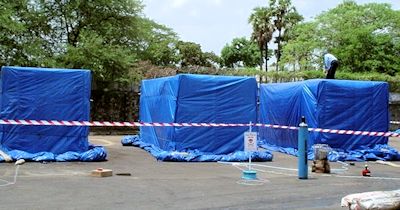Reprinted from the Carteret County News-Times
MOREHEAD CITY — Cogent Fibre has abandoned a controversial proposal to fumigate logs for export from the state port here.
Robert Mantrop, a partner with Cogent Fibre, said last week that the decision was based on public opposition, expressed during an informational meeting held Aug. 28 at the Crystal Coast Civic Center, to the use of a toxic pesticide to treat the log.
Supporter Spotlight
“As a company, we’ve thought long and hard and weighed our options,” Mantrop said.
About 150 attended the public forum at the civic center on the plan and the recently filed state air quality permit application to use the pesticide methyl bromide. Many who spoke at the city-sponsored meeting said the plan is dangerous and incompatible with the surrounding area.
Because it is considered an ozone-depleting substance, methyl bromide was phased out by the Environmental Protection Agency in 2005, except for allowable “critical use exemptions” – cases in which there are no technically and economically feasible alternatives or substitutes available that are acceptable from the standpoint of environment and public health, according to the EPA.
The pesticide is still allowed to fumigate logs, and many countries require that imported logs first be treated with the pesticide. The EPA also allows strawberry growers and some food producers to also use methyl bromide.
 Logs are covered in tarps and readied for fumigation. Photo: Capital Pest Control, India |
Cogent Fibre had planned to contract the fumigation work out to Royal Pest Solutions Inc., also known as Royal Fumigation, of New Castle, Del., the company that applied earlier this summer for an air quality permit for the operation at the State Port in Morehead City.
Supporter Spotlight
Mantrop said the public’s questions and concerns, along with concerns of some company officials, led to the decision to scrap the plan.
The project was in its “exploratory stages,” he said.
“We were just going through the process to see if it (the log-export business) was something that could be done,” Mantrop said. “The (Aug. 28) meeting was preemptive but it made us step back.”
He said Cogent Fibre also researched methyl bromide, and officials with the company didn’t like the results.
“We want to be viewed as a company that has a positive impact in the community,” he said.
Cogent Fibre also released a statement on the decision, saying the company’s primary “mandate” is to operate its business in a socially and environmentally responsible manner.
“To date Cogent has continually adhered to this mandate with its existing wood chip operation in Morehead City, N.C., since 2011 and its operation in Savannah, Ga., since 2005. The bulk log- exporting business that is of concern represented a new and unique export opportunity for the Port of Morehead City and Cogent Fibre that was worthwhile exploring,” according to the statement.
The company stated that the first step of any new agricultural trade is to determine regulations and requirements for the product between the exporting and importing countries.
In this case of exporting Southern yellow pine logs to India and China, both countries require the use of methyl bromide as a fumigant before shipping and do not allow for any other method of fumigation.
Cogent had contacted the N.C. State Ports Authority to determine if methyl bromide fumigation was allowed at the port here.
“We were instructed that the current air permit did not allow for such fumigation at the Port of Morehead City but that there is a permitting process conducted by the North Carolina Department of Natural Resources and Air Quality to determine if the activity would be permitted or not,” according to the statement.
Royal Pest Solutions’ permit application was received at the N.C. Division of Air Quality on July 1. The permitting process was expected to take nine to 12 months, according to Cogent.
“However, it was clear from the meeting that there is significant public concern regarding the potential project and more specifically the use of methyl bromide,” Cogent said in the statement.
“As a company it is of great importance to the partners and employees of Cogent Fibre to continue to represent a positive impact on the local community and environment. With this in mind, Cogent Fibre would like to announce that it has listened to the concerns put forward during the meeting and has concluded that those concerns are significant enough to discontinue the pursuit of this project any further.”
The company stated that it will continue with its existing wood chip operations and “continue to develop new opportunities that are in accordance with our mandate.”







